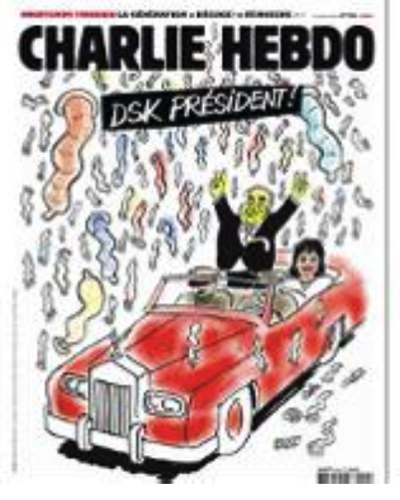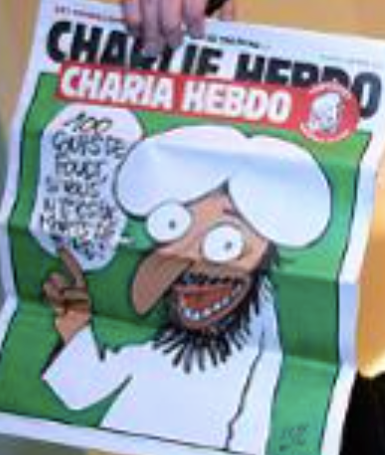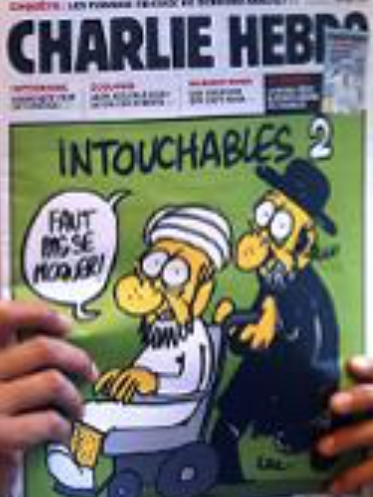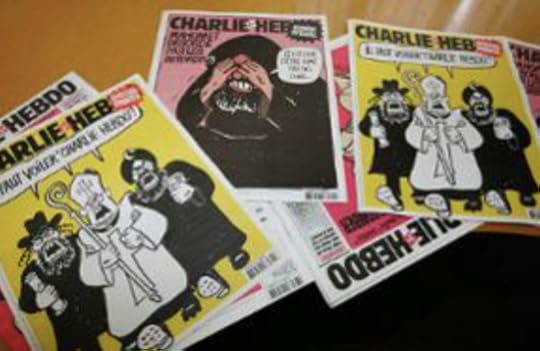¡No Pasarán!: Charlie Hebdo, and Juan Cole: Why al-Qaeda Attacked Satirists in Paris








And:
Juan Cole:
Sharpening Contradictions: Why al-Qaeda attacked Satirists in Paris:
"The horrific murder of the editor, cartoonists and other staff...
...of the irreverent satirical weekly Charlie Hebdo, along with two policemen, by terrorists in Paris was in my view a strategic strike, aiming at polarizing the French and European public.
The problem for a terrorist group like al-Qaeda is that its recruitment pool is Muslims, but most Muslims are not interested in terrorism. Most Muslims are not even interested in politics, much less political Islam. France is a country of 66 million, of which about 5 million is of Muslim heritage. But in polling, only a third, less than 2 million, say that they are interested in religion. French Muslims may be the most secular Muslim-heritage population in the world (ex-Soviet ethnic Muslims often also have low rates of belief and observance). Many Muslim immigrants in the post-war period to France came as laborers and were not literate people, and their grandchildren are rather distant from Middle Eastern fundamentalism, pursuing urban cosmopolitan culture such as rap and rai.
In Paris, where Muslims tend to be better educated and more religious, the vast majority reject violence and say they are loyal to France.
Al-Qaeda wants to mentally colonize French Muslims, but faces a wall of disinterest. But if it can get non-Muslim French to be beastly to ethnic Muslims on the grounds that they are Muslims, it can start creating a common political identity around grievance against discrimination.
This tactic is similar to the one used by Stalinists in the early 20th century.
Decades ago I read an account by the philosopher Karl Popper of how he flirted with Marxism for about 6 months in 1919 when he was auditing classes at the University of Vienna. He left the group in disgust when he discovered that they were attempting to use false flag operations to provoke militant confrontations. In one of them police killed 8 socialist youth at Hörlgasse on 15 June 1919. For the unscrupulous among Bolsheviks–who would later be Stalinists– the fact that most students and workers don’t want to overthrow the business class is inconvenient, and so it seemed desirable to some of them to ‘sharpen the contradictions’ between labor and capital.
The operatives who carried out this attack exhibit signs of professional training. They spoke unaccented French, and so certainly know that they are playing into the hands of Marine LePen and the Islamophobic French Right wing. They may have been French, but they appear to have been battle hardened. This horrific murder was not a pious protest against the defamation of a religious icon. It was an attempt to provoke European society into pogroms against French Muslims, at which point al-Qaeda recruitment would suddenly exhibit some successes instead of faltering in the face of lively Beur youth culture (French Arabs playfully call themselves by this anagram). Ironically, there are reports that one of the two policemen they killed was a Muslim.
Al-Qaeda in Mesopotamia, then led by Abu Musab al-Zarqawi, deployed this sort of polarization strategy successfully in Iraq, constantly attacking Shiites and their holy symbols, and provoking the ethnic cleansing of a million Sunnis from Baghdad. The polarization proceeded, with the help of various incarnations of Daesh (Arabic for ISIL or ISIS, which descends from al-Qaeda in Mesopotamia). And in the end, the brutal and genocidal strategy worked, such that Daesh was able to encompass all of Sunni Arab Iraq, which had suffered so many Shiite reprisals that they sought the umbrella of the very group that had deliberately and systematically provoked the Shiites.
‘Sharpening the contradictions’ is the strategy of sociopaths and totalitarians, aimed at unmooring people from their ordinary insouciance and preying on them, mobilizing their energies and wealth for the perverted purposes of a self-styled great leader.
The only effective response to this manipulative strategy (as Grand Ayatollah Ali Sistani tried to tell the Iraqi Shiites a decade ago) is to resist the impulse to blame an entire group for the actions of a few and to refuse to carry out identity-politics reprisals.
For those who require unrelated people to take responsibility for those who claim to be their co-religionists (not a demand ever made of Christians), the al-Azhar Seminary, seat of Sunni Muslim learning and fatwas, condemned the attack, as did the Arab League that comprises 22 Muslim-majority states.
We have a model for response to terrorist provocation and attempts at sharpening the contradictions. It is Norway after Anders Behring Breivik committed mass murder of Norwegian leftists for being soft on Islam. The Norwegian government launched no war on terror. They tried Breivik in court as a common criminal. They remained committed to their admirable modern Norwegian values.
Most of France will also remain committed to French values of the Rights of Man, which they invented. But an insular and hateful minority will take advantage of this deliberately polarizing atrocity to push their own agenda. Europe’s future depends on whether the Marine LePens are allowed to become mainstream. Extremism thrives on other people’s extremism, and is inexorably defeated by tolerance.
Let me conclude by offering my profound condolences to the families, friends and fans of our murdered colleagues at Charlie Hebdo, including Stephane Charbonnier, Bernard Maris, and cartoonists Georges Wolinski Jean Cabut, aka Cabu, and Berbard Verlhac (Tignous)– and all the others. As Charbonnier, known as Charb, said, ‘I prefer to die standing than to live on my knees.’
Rudolph: This vile tactic was exploited in the late 1990s: ‘[B]in Laden, Zawahiri, and company were pursuing bigger ambitions [than other jihadists]—waking the Muslim community from its slumber.… In a secret 1998 letter to another militant—recovered in 2001 from captured Al Qaeda computers in Kabul—Zawahiri points out that Al Qaeda had escalated the fight against ‘the biggest of the criminals, the Americans’ to drag them for an open battle with the nation’s masses…’ Bin Laden and Zawahiri ‘expected a Muslim response similar to that following the Russian invasion and occupation of Afghanistan. Their goal was to generate a major world crisis, provoking the United States…; American attacks on Muslim countries would reinvigorate and unify a splintered, war-torn jihadist movement and restore its credibility in the eyes of [Muslims]…’
Mark Vuletic: I’m willing to be argued with, but I find it difficult to believe that the primary goal of this attack was to provoke a backlash against French Muslims. If that had been the primary goal, then why they attack Charlie Hebdo of all things? As strong as the reaction has been, it surely would be a thousand times stronger had they targeted, say, an elementary school. If there is a recruitment message in the attack, the choice of target makes it seem as though the message is aimed directly at any other Muslims who might already be primed for radicalization.
Juan Cole: They also attacked intellectuals in Iraq as a way of polarizing things; intellectuals have fans.
Neil: ‘Most of France will also remain committed to French values of the Rights of Man, which they invented. ’ Great article; thanks. A correction: if any people invented the Rights of Man, it was most likely the Persians. Google the Cyrus Cylinder.
George Carty: One major reason why the Front National is polling well in France is the failure of François Hollande’s economic policies. He desperately wants to help the French working class, but he is trapped by the Euro (much as Ramsay MacDonald – the Depression-era British Labour prime minister – was trapped by the Gold Standard). The Front National’s policy of quitting the Euro (and presumably allowing the New Franc to depreciate so that France could regain competitiveness) probably looks like an attractive alternative.
Anyway, could the Front National itself have been a target in this latest atrocity? Marine Le Pen has sought to distance the party from its neo-Nazi past as much as possible, as well as from genuine Islam-haters such as the Netherlands’ Geert Wilders. Perhaps this attack was meant to bolster hard-line Islamophobes against moderates within the FN?
Appalled: Very good and important insight from Juan Cole. But just to note, referring to ‘Stalinist’ tactics in 1919 rings a slipshod note. Stalinist as a term applies to later era. ‘Bolshevik,’ I think would be more historically correct.
Michael G. Renner: Your analysis seems, sadly, spot-on. This horrific attack will lift the hopes of all those who are already pushing their reactionary agendas on the back of perceived ‘Islamization.’ In Germany, for example, the reactionary Pegida (an acronym that stands for ‘Patriotic Europeans against the Islamization of the Occident’) has been rearing its ugly head for several weeks now, but counter-demonstrations have attracted far more people, and thankfully the political elites have largely distanced themselves from this anti-immigrant, anti-Muslim group.
But the Paris slaughter will be wind under their wings, judging by initial reactions on the discussion boards of German newspapers. We are in for highly-charged, difficult times, in many countries. Perspectives like yours, Prof. Cole, are desperately needed. So, a heartfelt thanks for your analysis.
Juan Cole: Out of 5-6 million Muslims, a few hundred went to fight in Syria; note that the French gov’t wanted Bashar overthrown, too. This is not a counter argument
A. Waters: I would go even further, Juan, and say that ‘‘sharpening the contradictions’ exists as a strategy because of the problem of creating ‘imagined communities’ for a global diaspora whose religious beliefs and linguistic diversity make it incredibly challenging for there to be cross-cultural solidarity.... Few people understand how secular the Muslim population in France is as well as in Central Asia. Even fewer understand that the overwhelming majority of Iranians under 50 are ‘pro-Western.’
It’s politically shrewd though morally repugnant to use violence to create a sense of transnational solidarity among people whose cultural tastes, social identities and economic needs are so very different. It’s a tactic that is probably one of best ‘weapons of the weak’ in a militarized asymmetric political struggle.
Fear is a great mobilizer and how many states can adopt the Norwegian response to acts of terror? Unfortunately, reliance on panic, fear and distrust continue to be successful ways of accomplishing an otherwise impossible political strategy.
J. Bradford DeLong's Blog
- J. Bradford DeLong's profile
- 90 followers



